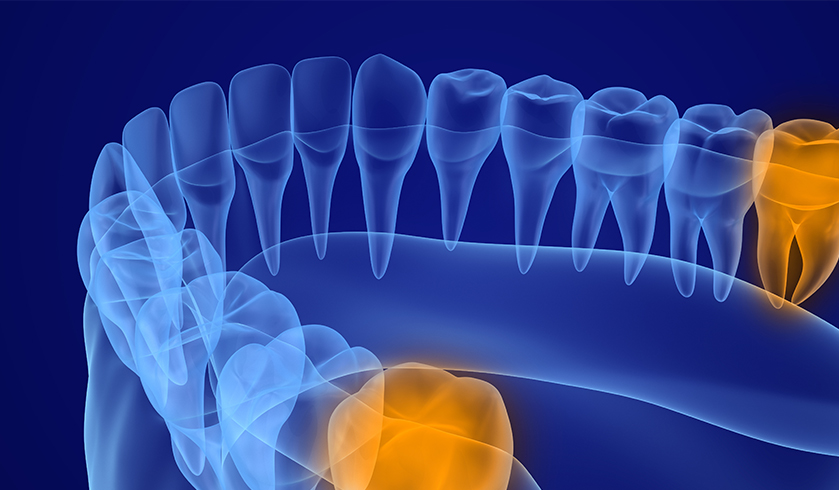Between the ages of 18 and 25 wisdom teeth begin to develop. Wisdom teeth form in the back corners of the upper and lower jaw and may consist of one to four third molars. Some people develop no wisdom teeth while others only have one.
Wisdom teeth can become impacted when the jaw is too small to accommodate their growth. This requires dental treatment otherwise impaction may contribute to the wisdom teeth becoming infected.
Wisdom tooth infection occurs when the impacted wisdom tooth causes gum or operculum swelling and inflammation. Bacteria may colonise around the inflamed wisdom tooth leading to infection. If not properly cleaned and removed, trapped food may also cause plaque and bacterial build-up leading to infection.

Symptoms of Wisdom Teeth Infection
Emergency dental care is required to treat wisdom tooth infection and severe impaction. In some cases, the dental professional may recommend wisdom tooth extraction to remove the infected tooth. Symptoms of an infected wisdom tooth include gum inflammation, swelling, pain, bad breath and the presence of pus or abscess.
It is vital that an emergency dentist be contacted to treat wisdom tooth infection, so that it does not spread to other parts of the body and cause general illness. Emergency dentists evaluate the individual’s wisdom teeth and use diagnostic tests to determine what treatment is best for the individual.
Patients who attend regular dental check-ups will have their oral condition assessed, so early signs of tooth decay and wisdom teeth infection can be identified in good time.
When caught early wisdom tooth infection can be treated before painful symptoms become unbearable and a threat to overall health. Early decisions can be made about how to treat impacted wisdom teeth with a high risk of infection. Not having treatment for impacted wisdom teeth may cause teeth misalignment and the need for orthodontic teeth straightening.
Some individuals avoid going to the dentist for assessment and treatment of wisdom teeth to reduce costs or out of fear (dental phobia). These people may suffer with sore gum tissue and pain in the teeth and jaw. Tooth sensitivity may be an early sign of wisdom tooth impaction and infection. Dentists provide finance options so that individuals receive the dentistry care they need. Treatments for dental phobia may also be provided and include IV or Conscious Sedation.

Tooth Decay, Oral Disease and Wisdom Teeth Infection
An infected wisdom tooth may cause bacteria and decay to spread to other teeth. A root canal infection can develop throughout the tooth roots and require root canal treatment to remove the infection. Individuals with root canal infection are at risk of bone and tooth loss. Having regular dental check-ups and professional dental cleaning is a means of identifying and removing tooth decay and infection.
Oral diseases may develop if wisdom teeth impaction or infection is left untreated. These diseases include:
- Pericoronitis
- Periodontitis
Pericoronitis is an infection of gum tissue causing inflammation of the gums, oral pain, bad breath and a foul taste within the mouth. Periodontitis is inflammation and infection that spreads to periodontal ligaments which join the teeth and gum tissue to the jaw bone. This breaks them down and can cause teeth to become loose or fall out. Both conditions threaten oral health and raise the risk of health degeneration, diabetes and heart disease.
Preventing Wisdom Teeth Infection
Wisdom teeth development may be complex and result in impaction. The best way to prevent wisdom teeth infection is to have the growth of wisdom teeth monitored through dental check-ups. Practising regular oral hygiene through teeth brushing and flossing after meals and before sleep helps to clean teeth and reduces the risk of infection.
However, wisdom teeth require dental check-ups to monitor complications in wisdom teeth development and infection. If the condition is mild individuals may not recognise that infection has set in. Dental appointments enable early identification of wisdom teeth infection and impaction for treatment.
Get on touchTreating Wisdom Teeth Infection
Regular dental check-ups help dentists to identify early signs of wisdom teeth infection, pericoronitis and gum disease for appropriate treatment. Emergency dentists are qualified and experienced in treating wisdom teeth infection and other oral infections.
Initially, the infected area is cleaned to remove plaque and debris. Where necessary the dental infection is removed through dental infection removal, root canal treatment or tooth extraction. Wisdom tooth extraction prevents re-occurrence of wisdom teeth infection. Dentists try to preserve existing tooth structure where possible.
Dentists provide individuals with advice on how best to care for their teeth and tooth restorations, proper oral hygiene and how to prevent tooth infection, gum disease and tooth decay. Appointments can be set for dentists to monitor the growth of wisdom teeth so early intervention can be provided.

